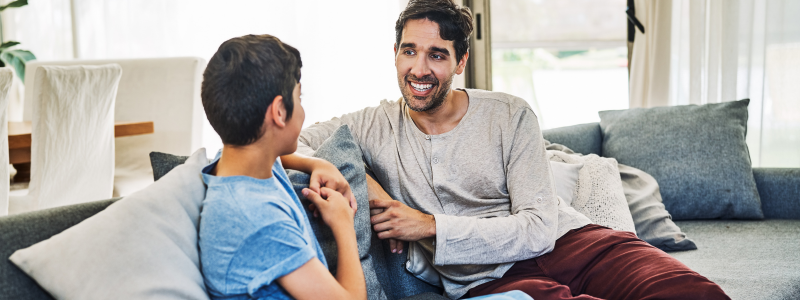Effective communication with a teenager is one of the most powerful tools a parent or caregiver can develop. The teenage years are often filled with emotional ups and downs, growing independence, and intense self-discovery. During this time, teens need more than rules and routines. They need understanding, respect, and open dialogue. Learning how to speak with, not at, your teen can transform your relationship and support their mental and emotional well-being.
At Adolescent Wellness Academy, we know that communication plays a central role in a teen’s overall well-being. Our mental health programs for adolescents are designed to support both teens and families as they navigate life’s challenges together.

Why Is Communication Important During the Teen Years?
Adolescence is a critical period of growth, and communication becomes the bridge between childhood and adulthood. Teens are developing their identities, questioning beliefs, testing boundaries, and exploring relationships. It is natural for conflict and tension to arise. Still, consistent and respectful communication can serve as an anchor through it all.
When parents learn to communicate effectively, they create a safe environment for their teenager to open up and share their thoughts and feelings. This safety fosters trust, encourages emotional expression, and builds resilience. In many cases, effective communication can also serve as a preventive measure against more serious mental health challenges.
What Are Common Barriers to Communication With a Teenager?
Even the most well-intentioned conversations can be misunderstood when teens and parents are navigating different emotional landscapes. Some of the most common barriers to effective communication with teenagers include:
- Mood Swings and Emotional Intensity: Hormonal changes can lead to increased emotional reactivity.
- Desire for Independence: Teens may resist parental input to assert autonomy.
- Digital Distractions: Social media, video games, and phones can pull attention away from face-to-face conversations.
- Parental Overreaction: When parents jump to discipline or judgment, teens may shut down entirely.
- Lack of Consistency: Mixed messages or unpredictable responses can make teens feel confused or unsafe.
Being aware of these barriers helps families avoid common pitfalls and shift toward more productive ways of interacting.
What Does Effective Communication with Teenagers Look Like?
Communicating effectively with a teenager involves more than just exchanging words. It requires listening, empathy, and the willingness to see things from their perspective. Some core elements of effective communication include:
- Active Listening: Make eye contact, put away devices, and show your teen that you are fully present.
- Validation: Acknowledge your teen’s feelings even if you disagree. Saying “That sounds really hard” goes much further than “You’re overreacting.”
- Respect: Avoid talking down to your teen. Please treat them with the same courtesy you’d expect.
- Nonverbal Cues: Body language, tone, and facial expressions matter as much as the words themselves.
These small shifts can lead to deeper trust and more open conversations over time.

Communication Techniques That Work for Parents and Caregivers
Not every conversation with a teen has to be deep or emotional. In fact, casual everyday chats often lay the groundwork for more meaningful exchanges. Here are some communication strategies that parents and caregivers can use:
Use “I” Statements
Rather than placing blame, focus on how situations make you feel. For example, say “I feel worried when I don’t hear from you” instead of “You never check in.”
Ask Open-Ended Questions
Avoid yes or no questions. Try, “What was the best part of your day?” or “What are your thoughts on…?”
Reflective Listening
Rephrase or summarize what your teen expressed to demonstrate that you genuinely listened to them. This practice not only validates their feelings but also encourages them to continue sharing their thoughts and emotions with you, fostering open communication between you both.
Create Space for One-on-One Time
Schedule weekly check-ins or use car rides and mealtimes to connect without distractions.
Stay Calm During Conflict
If emotions rise, it’s okay to pause the conversation and revisit it when both parties are calm.

Common Communication Mistakes to Avoid
Even the most loving parents can fall into unhelpful patterns. Recognizing and avoiding these habits can make communication more effective:
- Interrupting: Let your teen finish their thoughts without jumping in.
- Lecturing: Long speeches often cause teens to tune out.
- Shaming or Blaming: These approaches damage trust and increase emotional distance.
- Assuming You Know: Don’t presume you understand everything your teen is experiencing. Ask questions and listen.
Being mindful of these missteps creates a healthier dynamic and encourages your teen to be more honest and engaged.
Supporting Teen Mental Health Through Communication
Open communication is a crucial part of supporting your teen’s mental health. When teens feel safe expressing themselves, they are more likely to reach out for help when needed. Ongoing conversations can also help parents identify early warning signs of anxiety, depression, substance use, or self-harm.
At Adolescent Wellness Academy, we understand the connection between mental wellness and communication. That’s why our teen treatment programs integrate parent and family engagement from the very beginning. Whether through family therapy sessions or guided communication exercises, we help families rebuild connection and trust.
When to Seek Professional Help
Sometimes, even the best communication strategies are not enough to resolve serious challenges. If you notice the following signs, it may be time to seek professional support:
- Complete withdrawal from family
- Persistent anger, irritability, or sadness
- Sudden academic decline or school refusal
- Risk-taking behaviors or substance use
- Emotional shut-down or refusal to engage at all
In these cases, a structured mental health program can provide the support your family needs. Adolescent Wellness Academy offers evidence-based, teen-focused care that includes psychiatric support, individual therapy, and family involvement.

Why Effective Communication With Teenagers Is So Important
Effective communication with teenagers is not always easy, but it is always worth the effort. By listening more, reacting less, and staying engaged, parents can create a foundation of trust that supports their teen’s emotional health and future success.
If communication has become a challenge in your household, Adolescent Wellness Academy is here to help. Our programs are designed to meet the unique needs of teens and their families—because healing starts with connection.
About the Author

Brandsmen
Founder












